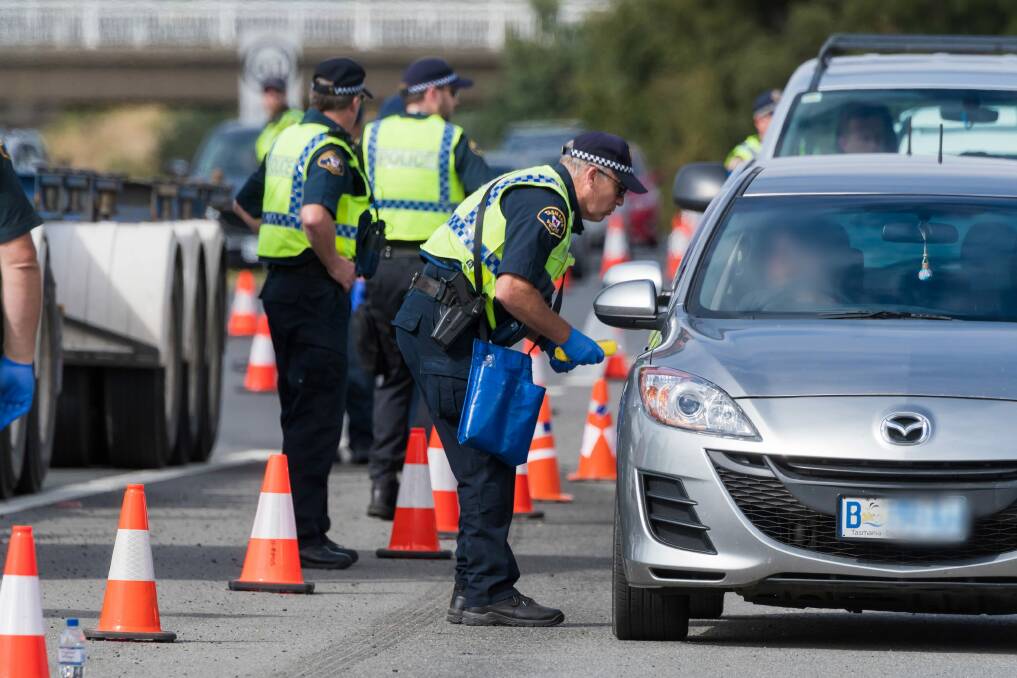
A road safety taskforce's ability to conduct major traffic operations continues to be "significantly" hampered because of their role in the state's coronavirus response.
Subscribe now for unlimited access.
$0/
(min cost $0)
or signup to continue reading
Police performance data from February shows major traffic operations were notably down across the state with only 13 major traffic operations conducted this financial year, down from 66 in the same period last year.
Of those operations conducted, only one was performed in the Western District, four in the North and eight in the South.
Tasmania Police's 16-officer strong road safety taskforce is funded by the Motor Accident Insurance Board, but members were still being used to support Tasmania's COVID response.
When questioned about what COVID-related tasks these officers were involved in, Tasmania Police did not provide a response.
The MAIB provides funding to the Road Safety Advisory Council for safety enforcement and education activities, with $3.98 million provided in the 2020-21 financial year.
Of that funding, $2.63 million was allocated to Tasmania Police for road safety enforcement activities and $1.35 million to the State Growth Department for road safety education activities.
The funding allows Tasmania Police to employ 16 officers for road safety teams across the state, and their travel, vehicles, safety equipment, and supplies.
Tasmania Police Assistant Commissioner Operations Jonathan Higgins said road safety taskforce members' active role in the state government's response to coronavirus had "significantly impacted their ability to undertake large-scale traffic operations throughout this period".
"Throughout the COVID-19 pandemic, Tasmania Police has been required to allocate significant resources to support Tasmania's response and ensure community safety," he said.
"Members from all over the state have been actively involved in this response, including those from the Road Safety Task Force."
When asked for a breakdown of how many of the 16 MAIB-funded officers were redeployed to coronavirus enforcement in January 2021, Assistant Commissioner Higgins said members of the taskforce maintained a capacity to undertake road safety activities while doing COVID-related tasks.
Police Association of Tasmania president Colin Riley said police numbers across all the required outputs were stretched, however, road safety enforcement remained a critical deliverable.
"We operate seven 24-hour police stations in the state. From current staffing, we operate an eighth for coronavirus duties and a ninth is composed of injured members unable to undertake policing," he said.
"That is why we are asking both political parties to commit to an increase of police officers by 70, with 33 in the Launceston area.
"Our members are the primary law enforcement strategy to reduce fatalities and serious injuries on Tasmanian roads. We just can't do it all, even though our members will try to."
An MAIB spokesman said the broad outcome of the funding, and RSAC, was to reduce road fatalities and serious injuries, with the reduction targets mirroring those set in the Tasmanian Road Safety Strategy 2017-2026.
"Prior to extending each multi-year year agreement, the MAIB engages a road safety expert to assess the performance of the program," the spokesman said.
"The most recent completed review was in 2017 ... which found that the MAIB's funding level was appropriate, that this funding continues to have benefits for the Tasmanian community and RSAC has contributed to a reduction in fatalities and serious injuries."
The road safety strategy's key target for the Towards Zero Strategy is to reduce the number of annual serious injuries or deaths on Tasmanian roads from 300 to less than 200 by 2026.
Our journalists work hard to provide local, up-to-date news to the community. This is how you can continue to access our trusted content:
- Bookmark www.examiner.com.au
- Make sure you are signed up for our breaking and regular headlines newsletters
- Follow us on Twitter: @examineronline
- Follow us on Instagram: @examineronline
- Follow us on Google News: The Examiner

